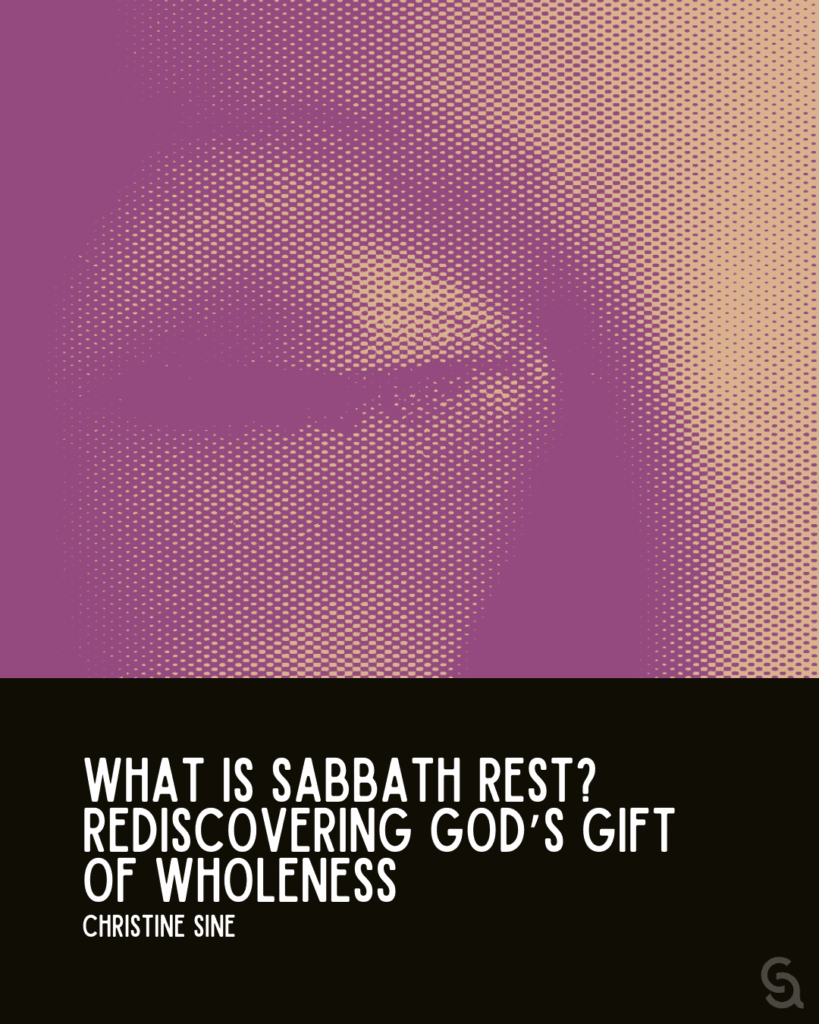 Why is it so difficult to put God’s priorities first? We talk about Sabbath but find it hard to practice. Could it be that we’ve misunderstood its purpose? The busyness and consumerism of our culture not only steal our time but also shape our focus. The first question we ask one another is, “What do you do for a living?”—work becomes our highest priority. Sabbath gets pushed to the margins, reduced to a day of recovery so we can work harder the next week.
Why is it so difficult to put God’s priorities first? We talk about Sabbath but find it hard to practice. Could it be that we’ve misunderstood its purpose? The busyness and consumerism of our culture not only steal our time but also shape our focus. The first question we ask one another is, “What do you do for a living?”—work becomes our highest priority. Sabbath gets pushed to the margins, reduced to a day of recovery so we can work harder the next week.
What we need isn’t just minor schedule adjustments, but a fundamental reorientation of our purpose for living.
When I embraced Sabbath 20 years ago, it transformed my life and reshaped how I prioritize time. Still, I need constant reminders, because my focus slips. In Jewish Days: A Book of Jewish Life and Culture, Francine Klagsbrun calls Sabbath a miracle—unlike anything else in the natural world, appearing fully formed in the Talmud.
In Jesus’ time, Romans ridiculed Jews for observing a day of rest, dismissing it as laziness. Yet even some recognized its value for refreshing body and mind. From a Jewish perspective, Sabbath was never just “rest” but the culmination of the week—the day that gave purpose to all the others. Abraham Heschel, in The Sabbath, reflects on Genesis 2:2, “On the seventh day God finished his work.” Jewish philosophers concluded that what God created on that day was Sabbath itself: a sacred time of peace, joy, and wholeness. For Heschel, “The essence of the world to come is Sabbath eternal.”
The Jewish people longed for a future where Sabbath became a way of life every day. Early Christians believed that through Christ’s resurrection, this eternal wholeness had already broken into the present. No wonder Jesus so often healed on the Sabbath—not diminishing it, but revealing glimpses of the world God promised.
For Christians, Sabbath was the culmination of the week, a time to rest in God’s wholeness and celebrate signs of renewal they had seen, while preparing to embody God’s Sabbath presence in the days ahead.
Walter Brueggemann puts it plainly in Sabbath as Resistance:
“Sabbath, in the first instance, is not about worship. It is about work stoppage. It is about withdrawal from the anxiety system of Pharaoh, the refusal to let one’s life be defined by production and consumption and the endless pursuit of private well-being.”
Sabbath is meant to realign us with God’s peace, abundance, and joy. It restores our relationship with God, with one another, and with creation. For my husband, Tom, and me, Sunday mornings often begin with journaling and asking: “Where have I seen God’s wholeness this week? Where can I bring more of it into the week ahead?”
Sabbath also reminds us that we are part of Christ’s global body. As we worship and share communion, we join with God’s diverse family across cultures, backgrounds, and centuries. At the same time, we are called to remember those for whom rest is still out of reach—the hungry, the neglected, the oppressed. Early Christians understood this well. Sabbath wasn’t just for themselves; it was for everyone. They welcomed abandoned children, cared for the sick, and drew the marginalized into community, embodying God’s Sabbath rest for others.
Sometimes I wrestle with guilt: How can I rest while so many suffer? But Sabbath teaches me to notice the small, Spirit-led acts—like listening to a discouraged friend—that carry God’s fingerprints. Without this rhythm, I slide into frantic striving, pushing God’s joy and abundance to the margins.
Sabbath is also a time to delight in creation. A walk in the garden, a drive in the countryside, or even a quiet moment outdoors can remind us that God’s presence saturates the world around us. Jesus criticized the Pharisees not because Sabbath was unimportant, but because they had lost sight of its joy. He restored its original purpose: to celebrate God’s healing and wholeness.
I once heard of neighbors in Canada who embodied Sabbath living by organizing a weekly “help-out morning.” They rotated between homes, tackling chores that had lingered undone—scrubbing walls, painting, gardening. What began with an exploded pot of forgotten eggs grew into a rhythm of shared work, laughter, prayer, and community. “It is good for our homes,” one said, “but mostly for our souls.” That is Sabbath in action, seven days a week.
In a culture that glorifies busyness, Sabbath invites us to make hard but freeing choices. How might you practice Sabbath more authentically? How could your week be reoriented toward glimpses of God’s eternal peace? What one small change could you make to turn—again—toward God’s wholeness?
 Christine Aroney-Sine is a contemplative activist, passionate gardener, and author. She loves inspiring Jesus followers to dig in the dirt, laugh, and have fun creating spiritual practices that intertwine the sacred through all of life. She’s the founder and facilitator for the popular contemplative blog godspacelight.com, and her most recent book is The Gift of Wonder: Creative Practices for Delighting in God.
Christine Aroney-Sine is a contemplative activist, passionate gardener, and author. She loves inspiring Jesus followers to dig in the dirt, laugh, and have fun creating spiritual practices that intertwine the sacred through all of life. She’s the founder and facilitator for the popular contemplative blog godspacelight.com, and her most recent book is The Gift of Wonder: Creative Practices for Delighting in God.


